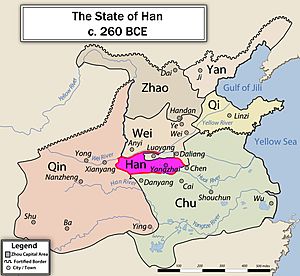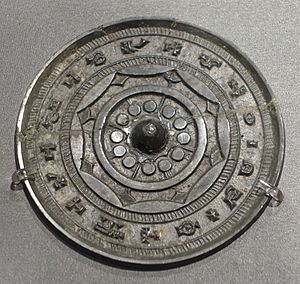Shen Buhai facts for kids
Quick facts for kids Shen Buhai |
|||||||||||||||||||||||||
|---|---|---|---|---|---|---|---|---|---|---|---|---|---|---|---|---|---|---|---|---|---|---|---|---|---|
| Chinese | 申不害 | ||||||||||||||||||||||||
|
|||||||||||||||||||||||||
Shen Buhai (Chinese: 申不害; around 400 BC to 337 BC) was an important Chinese thinker and politician. He served as the top official, called Chancellor, for the Han state. He worked for Marquis Zhao of Han for 15 years, from 354 BC to 337 BC.
Shen Buhai was born in the State of Zheng. He was likely a minor government worker there. After the Han state took over Zheng in 375 BC, Shen Buhai became more important. He helped divide up the new lands and successfully changed how the government worked.
His ideas about how to run a government were later used in a philosophy called "Chinese Legalism". His most famous follower, Han Fei, included Shen Buhai's ideas in his own writings. Shen Buhai died naturally while still serving as Chancellor.
Many people believe Shen Buhai was very important in shaping how Chinese government works. He focused on choosing people for jobs based on their skills, not just their family. Some historians even think he laid the groundwork for the civil service examination. This was a system where people had to pass tests to get government jobs.
Contents
Shenzi: His Lost Book
Shen Buhai was known for writing in a style that was sometimes hard to understand. He wrote a book called the Shenzi (申子). This book had two chapters and focused on how to manage a government. Sadly, this book is now lost.
In 141 BC, during the rule of Emperor Wu of Han, Shen Buhai's ideas were officially banned. This happened because of the growing influence of Confucian thinkers. After this, people studied Shen Buhai's ideas much less. However, many of his basic ideas about managing government workers continued to be used.
The Shenzi was widely read during the Han dynasty. But by the time of the Liang dynasty (502-556 AD), it was listed as lost. We only know about it today from small parts quoted in other old books. These quotes were put together by a scholar named Herrlee G. Creel.
Shen Buhai's Philosophy of Government
Shen Buhai lived at a time when officials in the Han state were confused about what to do. Shen Buhai realized that a good government needed skilled people in jobs. He believed that officials should be chosen for their abilities. He also thought it was important to constantly check how well they were doing their jobs. He didn't focus on their "virtue" like Confucius did.
Shen Buhai believed the ruler should have the most power. The ruler needed to be smart and make all the big decisions. He thought the biggest danger to a ruler's power came from inside the government, from his own officials.
Shen Buhai's ideas, later called Shu or Techniques, were mostly about the ruler's role. They focused on how the ruler could control the government workers. This included choosing good ministers, checking their work, and making sure the ruler kept all the power.
Choosing the Right People
Shen Buhai's system for choosing government workers was called Xing-Ming (刑名). This means "holding actual outcome accountable to Ming." Ming can mean a person's speech or reputation. So, Xing-Ming meant comparing what an official said they would do with what they actually did. It was about finding the right person for the job based on their skills and achievements.
This idea became very important in Chinese government. It helped make sure that officials were chosen for their abilities, not just their connections.
The Ruler's Role: Wu Wei
Shen Buhai used the term Wu wei, which means "non-action" or "not interfering." For Shen Buhai, Wu wei meant that the ruler should not get involved in the daily tasks of his ministers. Instead, the ruler should supervise them closely.
Shen Buhai believed that if the government was well-organized, the ruler wouldn't need to do much. The ruler's job was to set the rules and then let his ministers carry out the work. This way, the ruler could stay in control without getting caught up in small details.
Shen Buhai also thought that the ruler's most skilled ministers could also be his biggest danger. So, the ruler needed special ways to keep them loyal and in check. He advised the ruler to keep his own thoughts and plans secret. By not showing his feelings or skills, the ruler could avoid being controlled by others.
Shen Buhai said: "The ruler controls the policy, the ministers manage affairs." He believed that by using good methods, the ruler could hide his intentions and let capable people do their jobs. This allowed the ruler to truly rule, by supervising without interfering.
Yin: Passive Mindfulness
To use these methods, the ruler needed to be objective. This idea was called Yin, or "passive mindfulness." It meant the ruler should listen to everything without judgment. The ruler would note all the details of what an official claimed they would do. Then, the ruler would compare these claims objectively with what the official actually achieved.
Yin also helped the ruler keep his true intentions and opinions hidden. This way, officials wouldn't know what the ruler was thinking, making it harder for them to trick him.
Shen Buhai's Lasting Impact
Shen Buhai's ideas had a big impact on Chinese history. The famous minister Li Si often talked about "supervising and holding responsible," which he learned from Shen Buhai. Even Qin Shi Huang, the first emperor of China, praised Shen Buhai for his ideas on choosing government workers.
Later emperors, like Emperor Wen of Han, were also interested in Shen Buhai's ideas. They used Xing-Ming to control their officials. Even Zhuge Liang, a famous strategist from a later period, valued Shen Buhai's writings.
Although Confucianism became the main philosophy in China, Shen Buhai's ideas about managing government and checking performance continued to be used. His focus on practical methods for running a state left a lasting mark on Chinese government.
See also
 In Spanish: Shen Buhai para niños
In Spanish: Shen Buhai para niños
 | Emma Amos |
 | Edward Mitchell Bannister |
 | Larry D. Alexander |
 | Ernie Barnes |



